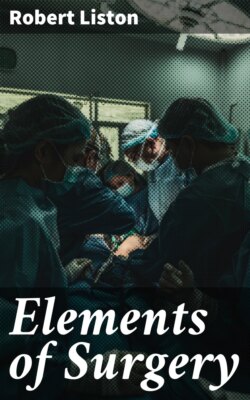Читать книгу Elements of Surgery - Robert Liston - Страница 3
На сайте Литреса книга снята с продажи.
PREFACE.
ОглавлениеTable of Contents
The rapid advancement made in the pathology and treatment of surgical diseases demands a perpetual revision and correction of the systematic works devoted to this department of the healing art.
Accordingly, text books, various in merit and extent, have emanated from the different schools. Several of these have, by successive editions, kept pace with the science; whilst others have fallen into disuse.
In this part of Britain, the systems of Latta, B. Bell, and Allan, occupied the field; but it being now vacant, I venture to supply the deficiency, by reducing the heads of my lectures into a compendium, or guide, for those students who resort to this city.
It must appear superfluous to preface such a work by anatomical descriptions, anatomy being now studied more generally, and with greater zeal, than heretofore. Pathology also is more attended to, and better understood. To which circumstances are to be ascribed the improvements in surgical science, as well as in the art of operating.
The functions and structure of parts are more frequently preserved uninjured—mutilation is more rarely required—and operations are dispensed with. The wider the extension of pathology, the fewer the operations will be—thus affording the best criterion of professional attainment. Who will question, that there is more merit in saving one limb by superior skill, than in lopping off a thousand with the utmost dexterity?
To treat surgical diseases as they ought to be treated, the practitioner must be thoroughly acquainted with the healthy and morbid structure; he must also have a mind vigorous and firm from nature, well instructed in the best precedents, and matured by observation.
Years are not the measure of experience. It does not follow, that the older the surgeon is, the more experienced and trustworthy he must be. The greatest number of well-assorted facts on a particular subject constitutes experience, whether these facts have been culled in five years or in fifty.
It is only from experience, directed and aided by previous study, that accuracy of diagnosis and celerity of decision can be acquired. Besides knowing in what manner to proceed, the surgeon must know well wherefore he acts, and also the precise time at which he should interfere. With knowledge and confidence derived from experience, he will perform such operations as are indispensable for the removal of pain and deformity, or for the preservation of life, with calmness and facility—with safety to his patient, and satisfaction to those who assist in, or witness, his proceedings.
Attention to the apparatus is necessary. It should be in good order, simple, and ample. The young surgeon should note down, previously to an operation, whatever, on reflection, can possibly be required. "For in most capital operations, unforeseen circumstances will sometimes occur, and must be attended to; and he who, without giving unnecessary pain from delay, finishes what he has to do in the most perfect manner, and that most likely to conduce to his patient’s safety, is the best operator."
It is seldom necessary to employ much preliminary treatment. From the usual preparative course of bleeding, purging, cooling diet, etc., patients about to undergo capital operations, as lithotomy, suffer more than they can gain.
It is of the utmost importance to attend to the state of the patient’s mind and feelings. He ought not to be kept in suspense, but encouraged and assured; and his apprehensions must be allayed. If this cannot be effected—if he is dejected and despondent—talks of the great risk, and of the certainty of his dying, it is better that the operation be abandoned, or at least delayed. If, on the contrary, he is confident in the resources of his constitution, and in the ability of his attendant, and looks forward to the advantage to be derived from his own fortitude, then should there be no delay.
A mild laxative may be given, when an empty state of the bowels is desirable, or when they, by acting too soon afterwards, might put the patient to inconvenience or pain, or interrupt the curative process.
Attention to after-treatment is of much greater importance. The practitioner is not to rely on success, however well the manual part has proceeded. He must consider his labour only begun, when the operation has finished; the patient is yet to be conducted, by kindness and judgment, through the process of cure.
It is thus only that difficult and unpromising cases can be brought to a happy conclusion, and favour and lasting reputation gained.
In the present work an endeavour has been made, in the first place, to lay down, correctly and concisely, the general principles which ought to guide the practitioner in the management of constitutional disturbance, however occasioned.
The observations introduced to illustrate the doctrines inculcated are given as briefly as is consistent with an accurate detail of symptoms and results. The descriptions of particular diseases have been sketched and finished from nature; and, it is hoped, with such fidelity, that their resemblance will be readily recognised.
To describe all the methods recommended and followed, in the different surgical operations, would occupy more space than can be allotted in an elementary work—would, without answering any good purpose, lead into the wide range of the history and progress of surgery.
Such modes of operating are described as have been repeatedly and successfully performed by the Author.
If by clear and simple description of the phenomena attendant on morbid action, and of the changes which it produces,—if by plain rules for the treatment of the diseases, and performing the operations for their alleviation or cure,—he contribute to the progress of surgery, and the consequent diminution of human misery, he will consider himself fully rewarded for the time and the labour spent on this production.
